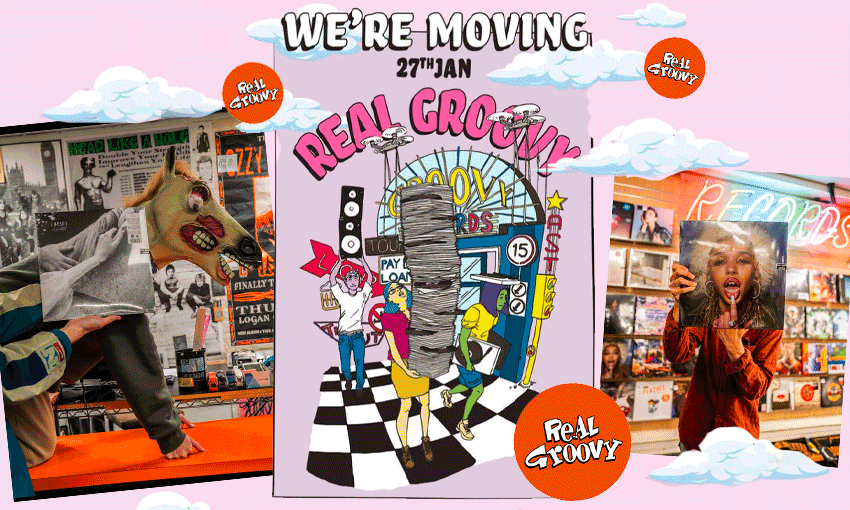The famous Auckland record store is once again on the move, making its biggest shift in decades. It’s expensive, difficult and entirely by choice. So why do it now?
When Real Groovy was forced to move shops across Queen Street in 2016, Chris Hart wore a Fitbit. By midnight, the owner of the inner-city Auckland record shop had clocked 58,000 steps – the equivalent distance of running a full marathon, much of it including hill and stair climbs.
Hart worked for another two hours, prepping his new store ready for opening day, then walked home. “I didn’t move much the next day,” admits the 66-year-old.
Next week, he’s doing it all again. Real Groovy, Hart’s famed 40-year-old record store which has weathered the test of time and constantly changing economic conditions, will next week move to somewhere it’s never been before – off Queen Street and into the very centre of town.
Next Thursday, staff, signs, all of the store’s furniture and everything it offers for sale, including hi-fi equipment, clothing, books, novelty gifts and a massive stockpile of 90,000 vinyl records, will move in above an inner-city supermarket at 19 Victoria Street.
It’s another chapter in the lengthy story of the Auckland store, where Kurt Cobain, Morrissey, Metallica and Santana have all browsed the vinyl. By now it’s moved so many times Hart has nearly lost count. This time, it’s entirely by choice. “We don’t have to move,” he admits.
Instead, it’s a shrewd business decision. The store’s current site at 520 Queen Street doesn’t get much foot traffic. Next to Victoria Street’s Countdown supermarket, foot traffic is guaranteed. In two years, when the City Rail Link finally opens, there’ll be even more. “That,” says Hart, “will be the way of the future”.
On the day The Spinoff visits the new location, it doesn’t look like much. Up the escalators and into the space where a long departed Warehouse Stationery used to sit, the walls have been painted dark purple. Cans of construction adhesive, ladders, rags, vacuum cleaners and empty bottles of kombucha litter the floors. Hart’s collection of 80 vintage neon signs are being installed on the walls before movers arrive next week.
It doesn’t yet resemble Real Groovy, or even look close to becoming a functioning record store. How’s it all going? “One disaster after another” laughs Hart. His construction crew is on holiday and won’t be back in time to build him a front counter. He’s just been told it’s unlikely he’ll have internet on opening day. And he still hasn’t sorted the parking situation.
“A number of things that can go wrong are going wrong,” he says. “People [who should be] turning up are not turning up.”
Despite the chaos, Hart’s still smiling because he’s done this many times before. He opened his first record store called Notoriety in Grey Lynn in 1980, but, reports Audioculture, it failed. Undeterred, he tried again, this time in Mt Eden, before moving closer to town.
It’s there that Real Groovy really started to fly, where the right location at 438 Queen Street combined with a booming local music industry, escalating CD sales and a rapidly expanding international touring market. Soon, Real Groovy expanded, opening stores in Wellington, Christchurch and Dunedin.
Fans camped out overnight for concert tickets, they’d get 500 people in for live shows, and visiting musicians would visit – either to shop for vinyl, or for signing sessions with fans. “That was insane,” says Hart. “It really was.”
But times changed. In 2009, Real Groovy went into receivership with Hart blaming a “bad foreign exchange deal”. He bought the business back from receivers, with all but his Auckland store closing in the years that followed. He learnt a lot about retail over that time – mostly that it was better to have just the one store and “take chances, do a bunch of weird things, be prepared to lose money here or there and have a ball” than to take the risk of expanding the brand.
Now, Real Groovy and other stores like it are enjoying a resurgence thanks to a renewed demand for vinyl. Boomers are buying their faves again, and their kids are getting into it too. During lockdowns, it became nearly impossible to get your hands on Lorde or Dire Straits records.
That’s also led to a surge in demand for second-hand stock, especially if it’s rare. One local hip hop record is in such short supply it’s going for more than $1,300. Amid all this, Hart says CDs are also making a comeback.
Hart’s forcing the move with one eye on the store’s future. He’s eyeing up improving central city conditions, increasing Queen Street patronage and cheaper rent, banking on increasing custom once the City Rail Link opening by the end of next year. Moving isn’t cheap – the moving company charges $25,000 on its own. He says the store usually runs at a loss after a move as customers get used to finding the new site. “It gives us two years to consolidate,” he says.
So, next Thursday, Real Groovy’s current location will close, a convoy of trucks will arrive and a group of burly movers will shift everything into the new site. By Friday, it will be open for business, with Hart probably clocking up a fair few steps in the process.
The crates of vinyl might not be organised, the internet may not be working, and there probably won’t even be a front counter. But a popular local band is booked to perform that night and “everything will be for sale,” says Hart. Spoken like a true retailer.



